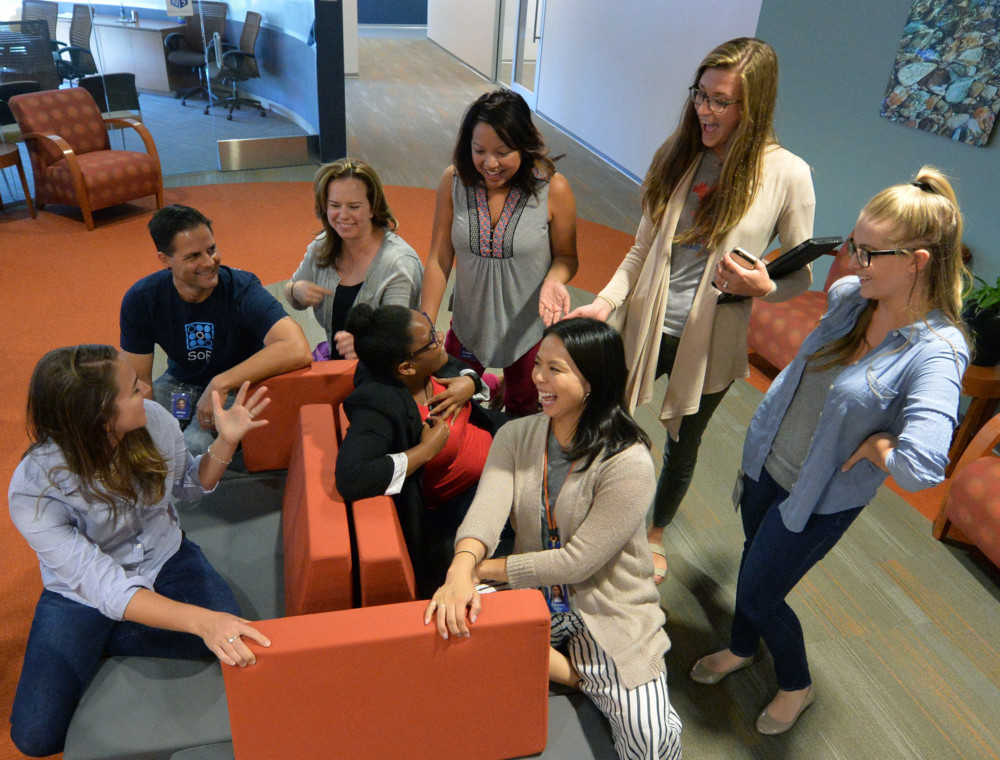By Michelle Quinn
The Mercury News
WWR Article Summary (tl;dr) For “Workday”, which sells human resources software, culture has been a chief focus. Their dedication to keeping employees happy and challenged seems to be working. Attrition is less than 10 percent annually, compared to the global tech average of 28 percent.
PLEASANTON, Calif.
Company culture is a fuzzy concept, a kitchen sink of traditions, values, the CEO’s favorite sayings.
Because culture doesn’t translate directly into sales, it often isn’t taken seriously.
That’s not the case at Workday, the human resources and financial services company, which nurtures its own unique corporate identity. “Employees” are a core value at the firm, because, as company leaders say, happy workers make happy customers.
Something seems to be is working. Attrition is less than 10 percent annually, the company says, compared to the global tech average of 28 percent. Workday claims a 98 percent customer satisfaction rating.
But with headcount up more than 30 percent to 6,000 workers over the past year and 25 percent projected annual employee growth, Workday faces a familiar challenge: Can its homey culture survive rapid expansion? And maybe as importantly, should it?
Founded in 2005, Workday now has more than 1,000 customers. Its stock is up nearly 20 percent from this time last year. Sales have grown 34 percent over the same period. Its market capitalization is $18 billion. Workday is bursting at the seams in the East Bay Area city of Pleasanton, and is building new offices.
When I visited the company’s headquarters, it seemed like a standard tech firm planted in the suburbs. Free bagels in the kitchenette and game rooms with ping pong and arcade pinball machines. Lots of cubicles. A dog here and there.
Unlimited paid time off? Check. Profit-sharing for everyone? Check. 401(k) match? Yes, starting in July, after employees groused. But no catered lunch, like many tech firms. No sleep pods, like Google. No edgy art like Facebook.
What is different is how Workday executives talk about their company culture. Along with “employees,” one of Workday’s other core values is “fun.” The company currently ranks 35 among the Best Places to Work on Glassdoor, the career site.
But companies experiencing high growth like Workday typically go through a rite of passage as they expand. Often, culture takes a hit. Workday seems to be no exception. It received an average 3.9 star rating out of 5 from past and current employees on Glassdoor’s site, down from 4.2 last year. That was better than Oracle (3.4) but lower than SAP (4.1), all of whom are key competitors. The tech industry average is 3.4.
While many of Workday’s 500-plus anonymous Glassdoor reviewers praise the firm’s perks and culture, some groused that the company isn’t the worker paradise it once was.
“Stop saying Culture is important and actually make some changes,” complained one reviewer. “No work/life balance at all,” said another. “Workday. Worknight. Workweekends.”
Striving to make employees happy isn’t something the tech industry has spent a lot of time on. Instead, it tends to focus on innovating and beating the competition. No one notices when the company’s culture walks out the door.
But for Workday, which sells human resources software, culture has been a chief focus.
“They may not pay the highest in the Valley but they have a good culture,” said R “Ray” Wang, principal analyst and founder of Constellation Research. For a seasoned tech worker or a young recruit, culture “makes a big difference.”
When they founded Workday, David Duffield and Aneel Bhusri, the firm’s CEO, (who both came from PeopleSoft, and left before Oracle completed its hostile takeover) personally interviewed the first 500 employees to make sure the company’s culture was set.
Workday has a special language that peppers its weekly newsletter, “First Thing Tuesday,” from Duffield and Bhusri, which includes news about “workbabies” and other personal milestones, vacation photos of employees sporting Workday shirts as well as business updates.
The company relishes its rituals. Like its giant Halloween event, which goes on for the last week of October. All five stories of its main building are transformed by more than 25 employee teams into a themed haunted workplace, which draws thousands of employees and their families. (Actual work does get done, say the firm’s executives).
Its twice-a-year all hands meetings at the area’s county fairgrounds include antics from Duffield and Bhusri, who once dressed like Star Wars characters.
“We are a We v. Me culture,” said Mark Peek, Workday’s co-president and a tech industry veteran who has worked at VMware and Amazon.com.
Workday also uses its own technology as a secret sauce to warm up the workplace. Its human capital management application gives workers a dashboard into career paths, open positions and employee benefits. (Digital First Media, the parent company of the Mercury News, is a customer of Workday).
It includes things as seemingly innocuous as reminders about colleagues’ birthdays and work anniversaries and as important as finding new jobs to apply for. The company also uses its own product, as well as Glassdoor reviews, to tap into employee sentiment and address concerns. Managers and employees can identify workers who are at risk of leaving Workday in the next six months.
Those are all good steps and show the company’s commitment to its employees. But if it continues to grow, Workday will have to build on the mythology of its founders and come up with even more ways to keep the Workmates happy.














































































































































































































































































































































































